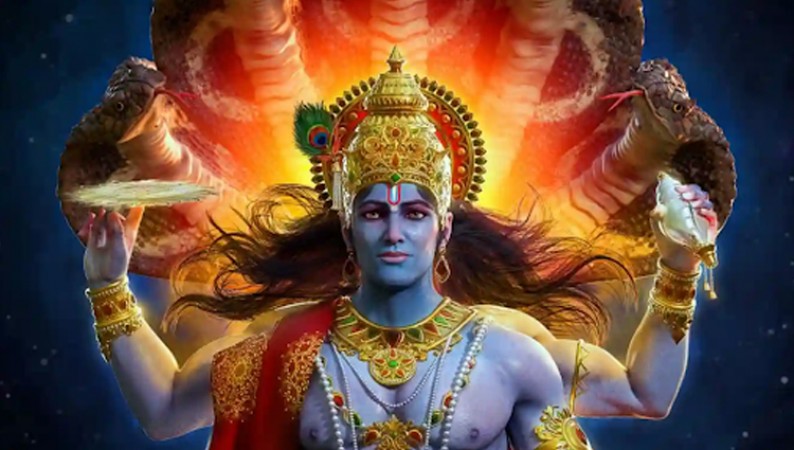
In Hindu mythology, Vishnu is one of the most significant deities, revered as the Preserver and Protector of the universe. As part of the Holy Trinity, alongside Brahma, the Creator, and Shiva, the Destroyer, Vishnu's role is to maintain cosmic order and harmony. This article delves into the fascinating attributes, stories, and symbolism associated with Lord Vishnu.
The Origins of Vishnu
Vishnu is considered one of the oldest deities in Hinduism. He emerges from the primordial ocean, lying on the serpent Ananta (Sheshnag), with a lotus sprouting from his navel. As the universe takes shape, Vishnu awakens to maintain its balance.
The Iconography of Vishnu
In artistic representations, Lord Vishnu is often depicted with a serene expression, having four arms that carry significant objects symbolizing his divine powers. He is adorned with royal garments and ornaments, exuding a sense of regal splendor.
Vishnu's Divine Forms and Avatars
Vishnu has incarnated in various forms, known as avatars, to restore order and righteousness whenever the universe is threatened by evil forces. The ten principal avatars, such as Rama and Krishna, are particularly revered.
The Ten Principal Avatars
Matsya (The Fish)
Kurma (The Tortoise)
Varaha (The Boar)
Narasimha (The Half-Man, Half-Lion)
Vamana (The Dwarf)
Parashurama (The Warrior with an Axe)
Rama (The Ideal King)
Krishna (The Divine Cowherd)
Buddha (The Enlightened Sage)
Kalki (The Warrior on a White Horse)
Other Prominent Incarnations
Apart from the ten principal avatars, Lord Vishnu has taken numerous other forms to protect his devotees and uphold righteousness.
Vishnu's Role as the Preserver
As the Preserver, Vishnu ensures the continuous cycle of creation, preservation, and destruction. He intervenes whenever the balance between good and evil tilts, thus averting cosmic catastrophes.
Vishnu's Consorts and Family
Vishnu is often depicted with his consort, Goddess Lakshmi, the symbol of wealth, prosperity, and purity. He also has other consorts and divine offspring, who play essential roles in various mythological narratives.
Goddess Lakshmi
Goddess Lakshmi, the epitome of grace and beauty, is the beloved wife of Vishnu. She represents abundance and fortune, and her presence alongside Vishnu symbolizes the inseparable connection between preservation and prosperity.
Lord Vishnu's Consorts
Apart from Lakshmi, Vishnu has other consorts, including Saraswati, the Goddess of Knowledge and Arts, and Ganga, the River Goddess.
Divine Offspring
Vishnu has several divine children, each possessing unique qualities and attributes. Among them are Kartikeya, the God of War, and Lord Hanuman, the devoted monkey deity.
The Symbolism of Vishnu
Each of Vishnu's four arms carries a symbolic object that represents his divine traits and powers.
Conch Shell (Shankha)
The conch shell symbolizes the primordial sound that created the universe and is blown like a trumpet during religious ceremonies.
Discus (Chakra)
The discus represents the cycle of time and the cosmic law of cause and effect. It is a potent weapon against evil forces.
Mace (Gada)
The mace signifies Vishnu's physical and mental strength and his ability to crush ignorance and dispel darkness.
Lotus (Padma)
The lotus symbolizes purity, beauty, and the unfolding of spiritual consciousness. It signifies Vishnu's transcendence over the material world.
The Mythological Stories of Vishnu
The tales of Vishnu's avatars and divine exploits are captivating and filled with moral lessons.
The Churning of the Ocean (Samudra Manthan)
The story of the churning of the ocean involves a battle between the Devas (Gods) and Asuras (Demons) to obtain the nectar of immortality.
Lord Vishnu and His Leelas (Divine Play)
Vishnu's leelas, or divine play, involve his interactions with mortal beings and his demonstration of benevolence and compassion.
The Tale of Narasimha Avatar
The Narasimha avatar is a thrilling story of Vishnu taking the form of a half-man, half-lion to protect his devotee, Prahlada, from his tyrant father.
Vishnu Worship and Festivals
Temples dedicated to Vishnu are widespread, and his devotees celebrate various festivals with great enthusiasm.
Temples Dedicated to Lord Vishnu
Prominent temples, such as the Tirupati Balaji Temple and the Vaishno Devi Temple, draw millions of devotees from around the world.
Major Vishnu Festivals
Festivals like Diwali, the Festival of Lights, and Holi, the Festival of Colors, are celebrated with fervor to honor Lord Vishnu and his avatars.
Vishnu's Teachings and Philosophy
Vishnu's teachings, especially in the Bhagavad Gita, emphasize the importance of righteousness, duty, and devotion.
The Bhagavad Gita
The Bhagavad Gita is a spiritual dialogue between Prince Arjuna and Lord Krishna, providing profound insights into life and the path to liberation.
Emphasis on Dharma (Righteousness)
Vishnu stresses the significance of adhering to one's righteous duties and leading a life of moral integrity.
Promoting Goodness and Virtue
Through his avatars, Vishnu demonstrates the triumph of good over evil, inspiring his devotees to lead virtuous lives.
Vishnu's Significance Beyond Hinduism
Vishnu's universal appeal extends beyond Hinduism, influencing various cultures and religious traditions.
Vishnu's Connection with Other Deities
Vishnu's harmonious relationship with Brahma and Shiva exemplifies the unity of the divine trinity in maintaining cosmic equilibrium.
Vishnu in Art and Culture
Vishnu's influence is evident in various art forms, such as sculptures, paintings, and performing arts.
The Eternal Nature of Vishnu
Vishnu's eternal presence in the cosmos reinforces the belief in an ever-watchful, benevolent deity.
Vishnu in Modern Context
The timeless stories of Vishnu continue to inspire contemporary literature, movies, and television shows. In Hindu mythology, Lord Vishnu stands tall as the Preserver and Protector of the universe, upholding dharma and showering blessings upon his devotees. His avatars and divine leelas serve as eternal sources of wisdom, morality, and spiritual guidance.
Windows Accessibility: Empowering Users with Special Needs
Artificial Intelligence (AI) Harmful Effects in Future
Fascinating Facts About the Human Brain: The Most Complex Organ